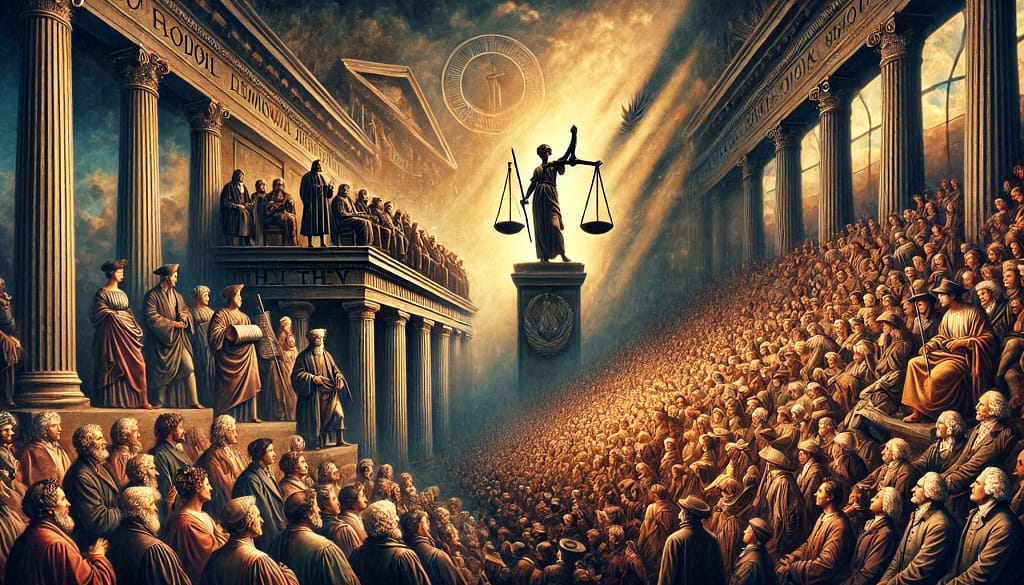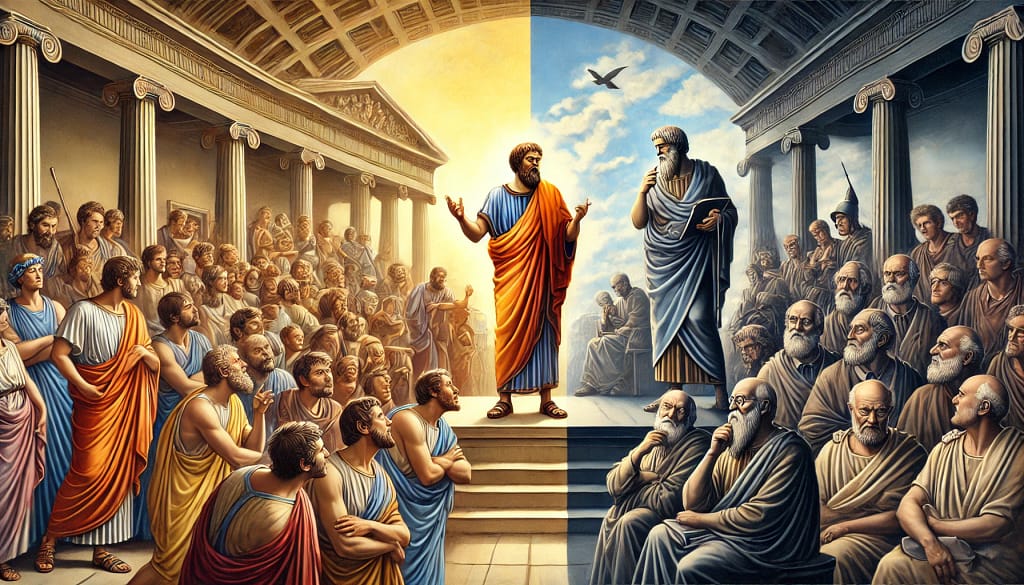
From the golden age of ancient Greece to the Enlightenment’s intellectual bloom, one question has persisted as a pivotal, unresolvable tension in the history of political thought: should power reside with the few or with the many?
On one side of this spectrum lies the voice of Protagoras, an early champion of participative democracy. Protagoras, a 5th-century BC philosopher, envisioned a society where all could engage in decision-making, advocating for the wisdom of the collective. On the other side, centuries later, Enlightenment thinkers, shaped by the stern logic of Plato, defended the notion that only the elite—those who could claim intellectual and moral superiority—should rule. This clash, ignited long ago, continues to define the boundaries of modern democratic principles, leaving us to ponder: do we trust the wisdom of the masses, or should governance be a privilege reserved for the educated few?
Protagoras and the Myth of Prometheus and Zeus
Protagoras was a revolutionary in his time, and his ideas were as daring as they were simple. He didn’t argue for democracy with elaborate doctrines or intricate theories; instead, he framed his beliefs within a myth that resonated deeply with his fellow Greeks. In Protagoras’ telling, Prometheus, the titan, stole fire from the gods and gifted it to humanity, along with the knowledge of the arts and technology. Later, Zeus bestowed two additional gifts: aidos (a sense of respect and shame) and dike (justice), which would allow humans to live together harmoniously in cities and societies.
To Protagoras, this myth was not just a story; it was a manifesto. He argued that these qualities—respect, justice, and wisdom—had been given to all humans, making each of us capable of contributing to society’s decision-making. In this view, democracy is not merely an institution; it’s an acknowledgment of the gifts humanity inherently possesses. Protagoras’ myth placed trust in collective wisdom, suggesting that, given these divine attributes, the many could govern themselves justly.

The Enlightenment Shift: A Platonic Influence on Governance
Millennia later, during the Enlightenment, a new era of thinkers challenged Protagoras’ optimism. While the Enlightenment was indeed an age of reason, equality, and individual rights, many philosophers were deeply influenced by Plato’s skepticism regarding the masses. Plato, in his seminal work “The Republic,” advanced a radically different view of governance. He argued that only a few—the philosopher-kings—were fit to rule. For Plato, true wisdom came from rigorous intellectual training and philosophical contemplation, qualifications most people did not possess. Thus, he believed that power should be confined to those few who could attain the rarefied knowledge needed for wise governance.
Enlightenment thinkers like Thomas Hobbes, John Locke, Montesquieu, and even Voltaire, despite championing reason and progress, leaned toward a Platonic model that trusted power to the hands of an elite few – a select few capable of guiding society wisely. This Platonic strain argued that without educated leaders to direct the populace, democracy would falter into chaos or, worse, into tyranny.

Hobbes viewed human nature as fundamentally self-interested and potentially chaotic, advocating for a strong, central authority to maintain order. Locke, while pioneering ideas of individual rights and government by consent, still believed that a stable society required the guidance of a well-educated, property-owning elite. Montesquieu added that the separation of powers could balance society’s needs but assumed these powers would be in the hands of those most capable of understanding and implementing laws.
In each of these philosophies, there’s a distinct echo of Plato’s “philosopher-kings”: the belief that only those with the requisite knowledge and rationality could rule effectively, reflecting a tempered faith in democracy that stops short of giving power to the many.
The Philosophical Divide: The Few vs. the Many
The divide between Protagoras and Plato is not merely a historical artifact; it embodies an ongoing tension that underscores today’s democratic debates. Should the power to decide rest in the hands of everyone, or should it be limited to those with the education, resources, and time to govern responsibly?
This question has evolved alongside our societies and shaped their structures, policies, and philosophies. In the 18th century, as the American and French Revolutions sought to dismantle monarchies, revolutionaries invoked the democratic promise that “the many” could govern. Yet, those who drafted the constitutions of France and the United States, despite their revolutionary rhetoric, were not proponents of full participation by the people. Rather, they designed systems that curtailed direct public influence, entrusting power instead to a select group of educated, property-owning men. They feared that opening governance to the wider populace could lead to impulsive, uninformed decision-making that would threaten stability.
In both the French and American democratic experiments, then, democracy was tempered by a Platonic caution. The early architects of these systems sought to create “representative” democracies, where only a limited segment of society would guide policy—essentially, a rule of the “well-informed” few over the many. This approach, rooted in Enlightenment-era elitism, illustrates how Plato’s ideas found a practical manifestation in the structures of early modern democracies, emphasizing a constrained form of civic participation.
The Legacy of Protagoras and Plato in Modern Democracies
Today, the impact of this philosophical divergence is evident in the structures of governments worldwide. Nations may declare themselves democracies, yet they often balance this claim with complex systems of representation, checks and balances, and elite institutions that guide or even constrain the people’s power. Our political systems, media, and educational institutions reflect this inherited skepticism: can all citizens, in their diverse backgrounds and expertise, wield political power responsibly?
The notion of democracy is no longer the straightforward dream Protagoras envisioned, yet the desire for true inclusivity remains. Grassroots movements, local councils, and digital platforms for edemocracy—all seek to restore Protagoras’ ideal by finding ways to make participation possible, meaningful, and accessible. And while skepticism about the people’s wisdom persists, so too does the aspiration for a more engaged and informed citizenry, suggesting that Protagoras’ vision, while tempered by Plato’s caution, continues to inspire the democratic ideals we strive toward.
Conclusion: Toward a Democracy for All
The debate between Protagoras and Plato is more than an ancient philosophical divide; it’s a question that modern democracy must answer to fulfill its true potential. Today, as we strive to create systems that are inclusive and participatory, projects like eDemocracy provide a path forward that champions the wisdom and input of all citizens. Digital tools now allow us to revisit Protagoras’ vision—bringing people together in a shared platform where everyone has the opportunity to participate directly in shaping society.
Instead of confining decision-making to a select few, eDemocracy embraces the belief that informed, engaged citizens can collectively govern with wisdom and justice. By leveraging technology, we can build a democracy that aligns with Protagoras’ ideals, fostering a society where each voice matters and all citizens can contribute meaningfully. This vision not only bridges ancient wisdom with modern potential but also builds a future where democracy becomes a living, inclusive dialogue accessible to everyone.